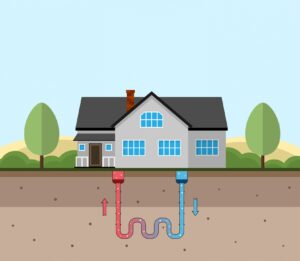You may have heard of geothermal heating and cooling. Some geothermal units use an air source method, while others use a ground source method. But which one is better? Each one has its own unique pros and cons, but one boasts a few more benefits than the other.
Ground source heating and cooling offers a wide variety of benefits compared to other HVAC options. If you’re interested in geothermal in Hillsboro, give our team a call. You can keep reading to learn more about how geothermal heating works and the benefits of this particular type of system. Discover why fall 2023 is the perfect time to purchase a heat pump for efficient heating and cooling solutions.
How Ground Source Heat Works
If you have a geothermal unit that uses the ground as a source of heating and cooling, you have piping that gets installed in loops in the ground of your yard. Similar to an air source heat pump, heat gets transferred into the ground as a method of cooling or heat gets drawn into your home from the ground as a method of heating.
During the summertime, a ground source geothermal unit absorbs heat and transfers it into the ground as a method of cooling your home. Then in the winter, it uses the earth’s natural heat to transfer warmth into your home. This method of transferring energy is highly energy efficient because heating and cooling are not being created.
Ground source systems can also be configured in either closed-loop or open-loop designs, depending on your property and water availability. Closed-loop systems circulate a fixed amount of liquid through underground pipes, while open-loop systems draw and discharge water from a well or nearby water source. Each method has its own advantages and can be tailored to meet your home’s unique needs, ensuring maximum efficiency and compatibility.
Overall Consistency
An air source geothermal unit offers far less consistency when it comes to heating. The temperatures in the outdoor air can change dramatically over a period of hours. Drawing heat in from the ground offers greater consistency since it takes a lot more to change the earth’s core temperature. Even as temperatures fluctuate above the ground, in the earth the changes happen in much smaller increments.
Another factor contributing to the consistent performance of ground source systems is their reduced reliance on external weather conditions. Unlike air source systems, which may experience efficiency drops during extreme temperatures, ground source systems maintain steady operation. This makes them especially suitable for regions with significant seasonal temperature fluctuations.
Ground source systems also offer exceptional reliability during extreme weather events. Unlike air source systems, which may struggle during temperature extremes, ground source heat pumps maintain stable performance because the ground temperature remains relatively constant throughout the year. This reliability ensures consistent comfort, even during the harshest seasons.
Environmental Impact
A ground source heat pump is much better for the environment compared to other types of heaters. A gas furnace uses combustion and releases a lot of carbon monoxide fumes into the air. Even an electric furnace causes more risks for the environment since electricity is being used.
While a ground source heating unit does use electricity, it requires far less power compared to other heater models. Less power means a lower impact. Reducing the impact on the environment may not save you any money or improve your overall comfort, but it is a wonderful added benefit and can make you feel that much better about using a ground source geothermal unit as an HVAC system for your home. Learn how springtime tips can improve heat pump efficiency and keep your system operating smoothly.
In addition, ground source systems reduce reliance on non-renewable energy sources. By tapping into the earth’s stable thermal energy, these systems significantly decrease greenhouse gas emissions, helping homeowners contribute to broader climate goals. This sustainable approach not only benefits the environment but can also align with eligibility for energy tax credits and local incentives.
Longevity
Ground source units are also known to have very long lifespans. Since a large portion of the unit is buried under the ground, it is less likely to be damaged during a storm or simply from the day-to-day exposure to elements. While installing a ground source geothermal unit is a large project, you have the peace of mind that the unit will last you for longer compared to the average lifespan of a furnace. Find out when repairing your heater may no longer be worth it and explore if a geothermal upgrade is the right choice.
Furthermore, ground source heat pumps typically require less frequent maintenance compared to traditional HVAC systems. With fewer moving parts and protected underground components, the likelihood of wear and tear is significantly reduced. This translates into lower long-term maintenance costs and fewer disruptions to your home’s comfort.
In addition to their long operational life, ground source systems require less frequent repairs and maintenance due to their protected underground components. This reduced wear and tear, coupled with professional maintenance, allows homeowners to enjoy worry-free operation and lower long-term ownership costs.
Shafer Heating & Cooling, LLC: You are just one call away from the comfort and savings you deserve! Schedule an appointment today for your service.

